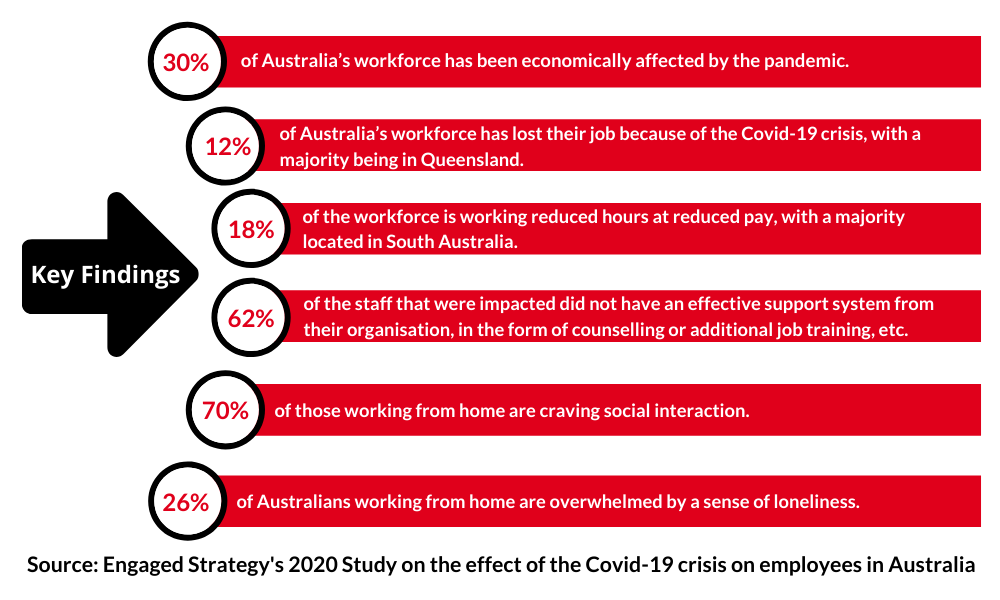COVID-19
Workforce
COVID-19 has left an emotional mark on those in the workforce

Freya Lucas
May 20, 2020
Save
As Australia is lifting restrictions on social distancing, and as a return to normal working conditions looms, there are a number of challenges to be considered by employers in many sectors and industries, including early childhood education and care (ECEC), with new research showing that mental health pressures from being economically impacted due to reduced hours or loss of a job has left the majority of the Australian workforce suffering.
A new study, conducted by Engaged Strategy has found that over half of the Australian workforces surveyed are battling what study authors term “multiple forces of uncertainty” such as job insecurity, fear of catching the virus, lack of social interaction and even loneliness, leaving them struggling with stress and anxiety.The Engaged Strategy study examined over 400 Australian workers, who were either employed up until until the COVID-19 restrictions came into force, or who remain currently employed, and found that regardless of employment status, one third of respondents are concerned about their job security.
“Financial crisis coupled with fear and insufficient organisational support, especially towards the 30 per cent of economically impacted workers, has indirectly affected emotional wellbeing,” Engaged Strategy Managing Director Christopher Roberts said.
Fear of contracting the virus where staff remain at work, or are required to return to the workplace is posing new challenges for employers, he added.
Assessing respondents on seven major parameters to identify the impact of the restrictions on their stress levels and anxiety, researchers found that fear of contraction will “massively impact” employees willingness to remain or return to work.
 “As restrictions are being lifted now, it is important for organisations to factor in their employees’ emotional readiness to return to work,” Mr Roberts said.
“As restrictions are being lifted now, it is important for organisations to factor in their employees’ emotional readiness to return to work,” Mr Roberts said.Half of those surveyed said that they did not feel supported by their employer, he continued, saying that the emotional strain of salary reductions, reduced work hours, and lay-offs were all significant stressors for employees, ones which employers should pay close attention to.
“People always remember (an employer, organisation or brand) for what it does for them during tough times” Mr Roberts said, adding that half the people that have been economically impacted said they did not feel supported by their organisation.
Even for those employees who were not economically impacted, support was important, with many respondents in this category saying they also did not feel supported by their organisation and are now fraught with anxiety.
Analysing the survey data, Mr. Roberts explained that unless organisations understand the pulse of their staff’s emotional wellbeing and develop an effective structure to help alleviate their employees’ fear of the crisis and health, productivity is “bound to witness a downturn”.
“The reason for the trigger of emotional anxiety may go away with the restrictions being lifted, but the scars of this lockdown will have residual effects which can affect employee productivity,” he added.
The survey was conducted by Engaged Strategy between 14 and 28 April 2020.
More information about Engaged Strategy may be found on their website.
Don’t miss a thing
Related topics
Report Summaries
Advocacy
Leadership
Affordability & Accessibility
Compliance
Legislation
Events News
In The Field
Family Day Care
Innovative Research
Long Day Care
NQF and Policy Changes
Outside School Hours Care
Politics
Preschool
Understanding Children
General News
Corporate activity
Supply & Demand
Allied Fields
Changes
Reporting
Examples
Marketplace
Professional development
Services
Personnel Appointments
Jobs News
Property
Jobs Tips and Resources
Products


















